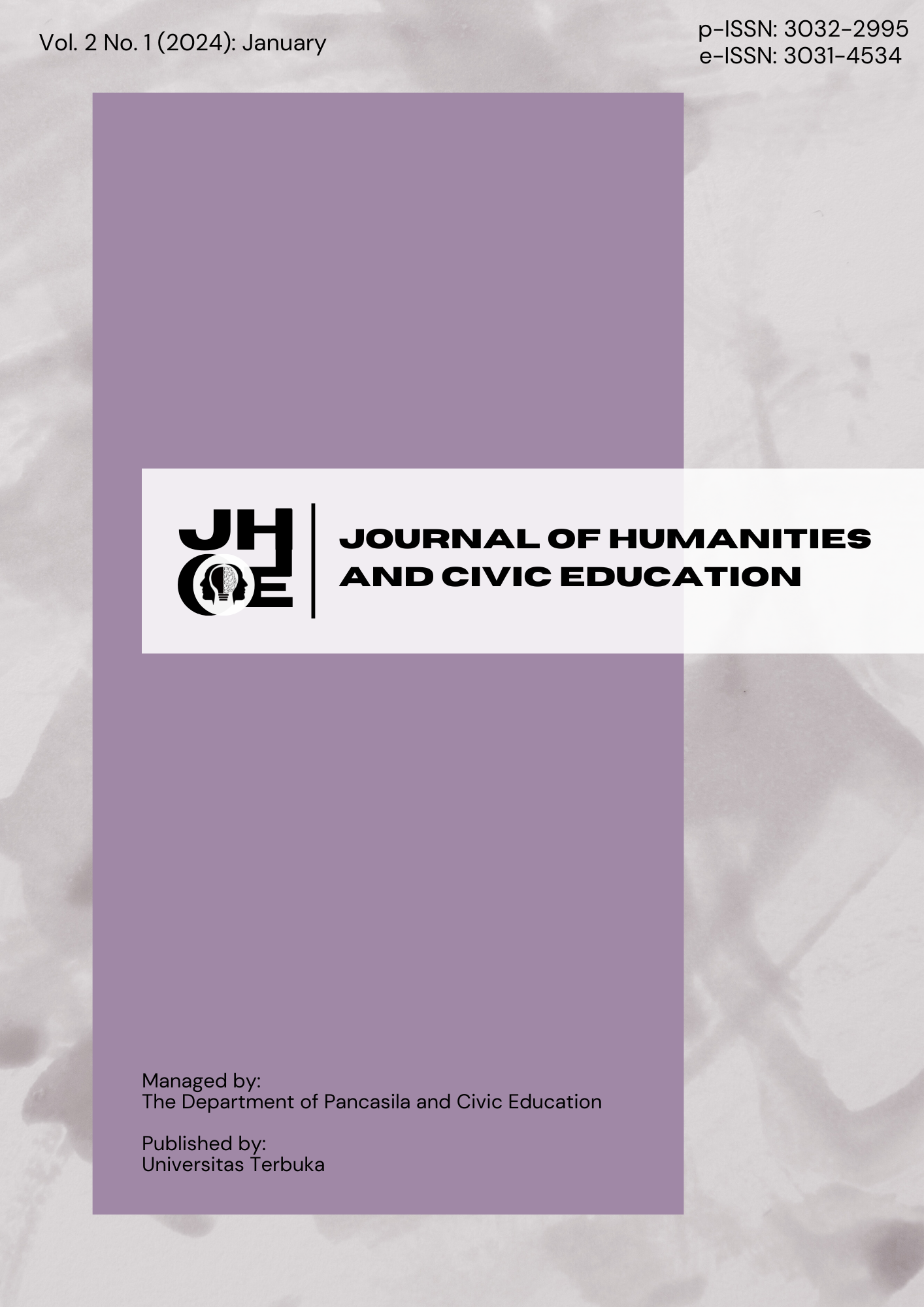Implementation of digital citizenship in the Projek Penguatan Profil Pelajar Pancasila
DOI:
https://doi.org/10.33830/jhce.v2i1.5800.Keywords:
digital citizenship, projek penguatan profil pelajar Pancasila (P5), character educationAbstract
The aim of this study is to describe and analyze the implementation of the Projek Penguatan Profil Pelajar Pancasila (P5) at SMP Negeri 6 Pangkalpinang. The research method used is qualitative descriptive by analyzing the planning, organization, implementation, and evaluation of the project conducted by the school. This study began with document analysis, distribution of questionnaires to 31 teachers as respondents, interviews, and field observations. The research findings indicate that project planning includes the formation of a team and the determination of the project theme. Project organization involves forming project group mentoring teams, determining research objects, and structuring student groups. The project implementation is carried out using a block system over 3-4 weeks. The project concludes with a showcase event (panen karya), where students' works are published and attended by students, teachers, and parents in an offline setting. To enhance the implementation of digital citizenship within the Pancasila Student Profile at SMP Negeri 6 Pangkalpinang, the involvement of all stakeholders—including students, teachers, school staff, and parents—is crucial. Through a comprehensive and consistent approach, the school can ensure that students are prepared to become responsible and skilled digital citizens.
References
Choi, M., Cristol, D., & Gimbert, B. (2018). Teachers as digital citizens: The influence of individual backgrounds, internet use and psychological characteristics on teachers’ levels of digital citizenship. Computers and Education, 121, 143–161. https://doi.org/10.1016/j.compedu.2018.03.005
Gazi, Z. A. (2016). Internalization of digital citizenship for the future of all levels of education. Egitim ve Bilim, 41(186), 137–148. https://doi.org/10.15390/EB.2016.4533
Hanafiah. (2022). Penanggulangan dampak learning loss dalam meningkatkan mutu pembelajaran pada sekolah menengah atas. JIIP-Jurnal Ilmiah Ilmu Pendidikan, 5(6), 1816-1823. https://doi.org/10.54371/jiip.v5i6.642
Ismail, S., Suhana, S., & Zakiah, Q. Y. (2021). Analisis kebijakan pengautan pendidikan karakater dalam mewujudkan pelajar Pancasila. Jurnal Manajemen Pendidikan dan Ilmu Sosial, 2(1), 76–84. https://dinastirev.org/JMPIS/article/view/388
Jones, L. M., & Mitchell, K. J. (2015). Defining and measuring youth digital citizenship. New Media and Society, 18(9), 2063–2079. https://doi.org/10.1177/1461444815577797
Kemendikbudristek. (2022). Dimensi, elemen, dan subelemen profil pelajar Pancasila pada Kurikulum Merdeka. In Keputusan Kepala Badan Standar, Kurikulum, Dan Asesmen Pendidikan Kementerian Pendidikan, Kebudayaan, Riset, dan Teknologi Nomor 009/H/Kr/2022.
Martin, F., Gezer, T., & Wang, C. (2019). Educators’ perceptions of student digital citizenship practices. Computers in the Schools, 36(4), 238–254. https://doi.org/10.1080/07380569.2019.1674621
MGIEP. (2017). Rethinking schooling for the 21st century: the state of education for peace, sustainable development and global citizenship in Asia. UNESCO: MGIEP.
Ribble, M. (2014). Digital citizenship in schools. International Society for Technology in Education.
Ruslan, R. (2008). Manajemen public relatoins & media komunikasi. PT Rajagrafindo Persada.
Sanjaya, W. (2013). Strategi pembelajaran berorientasi standar proses pendidikan. Kencana.
Sari, E. N., et al. (2021). Peran literasi digital dalam menangkal hoax di masa pandemi. Jurnal Politik dan Sosial Kemasyarakatan, 13.
Sufyadi, S., Harjatanaya, T. Y., Adiprima, P., Satria, M. R., Andiarti, A., & Herutami, I. (2021). Panduan pengembangan Projek Penguatan Profil Pelajar Pancasila. Pusat Kurikulum dan Pembelajaran Badan Standar, Kurikulum, dan Asesmen Pendidikan Kementerian Pendidikan, Kebudayaan, Riset dan Teknologi.
Yudi. (2020). Pendidikan yang berkebudayaan: histori, konsepsi, dan aktualisasi pendidikan transformatif. Gramedia.
Downloads
Published
How to Cite
Issue
Section
License
Copyright (c) 2024 Dini Oktariani

This work is licensed under a Creative Commons Attribution-ShareAlike 4.0 International License.




